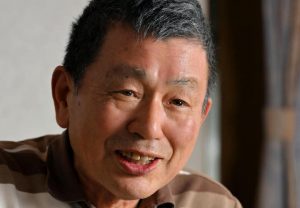To Nihon Hidankyo, winner of the Nobel Peace Prize: Satoru Ubuki, historian of Hiroshima A-bombing, says zeal of the pioneers led A-bomb survivor movements
Nov. 9, 2024
What should we do after receiving the prize?
The day after the announcement on October 11 that the Japan Confederation of A- and H-Bomb Sufferers Organizations (Nihon Hidankyo) would receive this year’s Nobel Peace Prize, Mr. Ubuki visited the grave of a person to report the news. It is Heiichi Fujii who is lying there. Mr. Fujii, who died in 1996 at the age of 80, strived to form the Hiroshima Prefectural Confederation of A-bomb Sufferers Organizations (Hiroshima Hidankyo) in 1956 and served as the first secretary general of the Nihon Hidankyo. He was in Tokyo the day of the atomic bombing, and was therefore not an A-bomb survivor, but his father and younger sister were killed in the bombing.
A feeling of “finally” filled me when I saw the news, as the Nihon Hidankyo had often been mentioned as a candidate for the Nobel Peace Prize. The Nobel Committee must be so alarmed about the current world situation in which nuclear weapons could be used.
It was good the Nihon Hidankyo was recognized, but I myself did not know how to take it. Reflexively wondering what Mr. Fujii would say, I visited his grave in Hiroshima City.
Mr. Ubuki has researched an enormous amount of A-bomb-related materials. Starting in 1981, while working at Hiroshima University’s Data and Specimens Center of Atomic Bomb Disaster in the university’s Research Institute for Nuclear Medicine and Biology (present-day Research Institute for Radiation Biology and Medicine), Mr. Ubuki spent much of his time interviewing Mr. Fujii.
While rebuilding a woodworking shop, his family business, Mr. Fujii poured so much of his money into the movements to support A-bomb survivors and to ban A- and H-bombs. He felt he could not forgive the atomic bombing that took the lives of his family, but he also used a unique phrase: “We’ve gotta hug (the United States).” I think he meant that we have to teach them while accepting their mistakes. He was a broad-minded person.
When we talk about Mr. Fujii, we should not forget his role as a member of a local welfare committee, which helps those in need. At that time, all the people in Hiroshima who needed his support were victims of the atomic bombing. He grasped their sentiments, “Restore everything as it was,” and linked them to the movements to ban A- and H-bombs.
He also had a remarkable political sense. He founded the organization to make socially influential statements, and formed many connections in government through his alma mater’s Acacia-kai (present-day alumni association of Hiroshima University Junior and Senior High School) and through his Waseda University connections. He was a social activist with a welfare point of view.
Mr. Ubuki continues to handle the materials he has collected and communicate information through his website “Hiroshima Ibun” (in English, ‘Literary remains of A-bombed Hiroshima’).
Mr. Fujii would say it is good the prize is going to the Nihon Hidankyo, but he would definitely scold me and say, “You idiot. It is more important what we do after receiving the award,” if I went around saying, “This is wonderful.” He was always thinking about what to do next.
I am worried about the future because such enthusiasm is now disappearing from Hiroshima. We have to learn from the history of Hidankyo. I keep thinking about what I myself should do after the announcement. My concern as an historian is the ongoing dispersion of A-bomb related documents. I hope there will be some kind of actions with people using the next year, the 80th anniversary of the atomic bombing, as a milestone opportunity.
(Interviewed by Michiko Tanaka, Senior Staff Writer)
◇
It has been 68 years since the Nihon Hidankyo was founded. We asked intellectuals in Hiroshima and those who supported the movements what they thought about the Nobel Peace Prize being awarded to the organization, which has called on the national government to compensate for the damage caused by the atomic bomb and appealed for the abolition of nuclear weapons.
Satoru Ubuki
Born in the city of Kure in Hiroshima Prefecture. Graduated from Kyoto University. After he supervised the compiling of such papers as “Hiroshima Prefectural History: A-bombing Documents” and worked as an assistant professor at Hiroshima University, Mr. Ubuki served as a professor at Hiroshima Jogakuin University until 2011. His specialty includes the history of the atomic bombing. Mr. Ubuki is 78 years old.
(Originally published on November 9, 2024)








